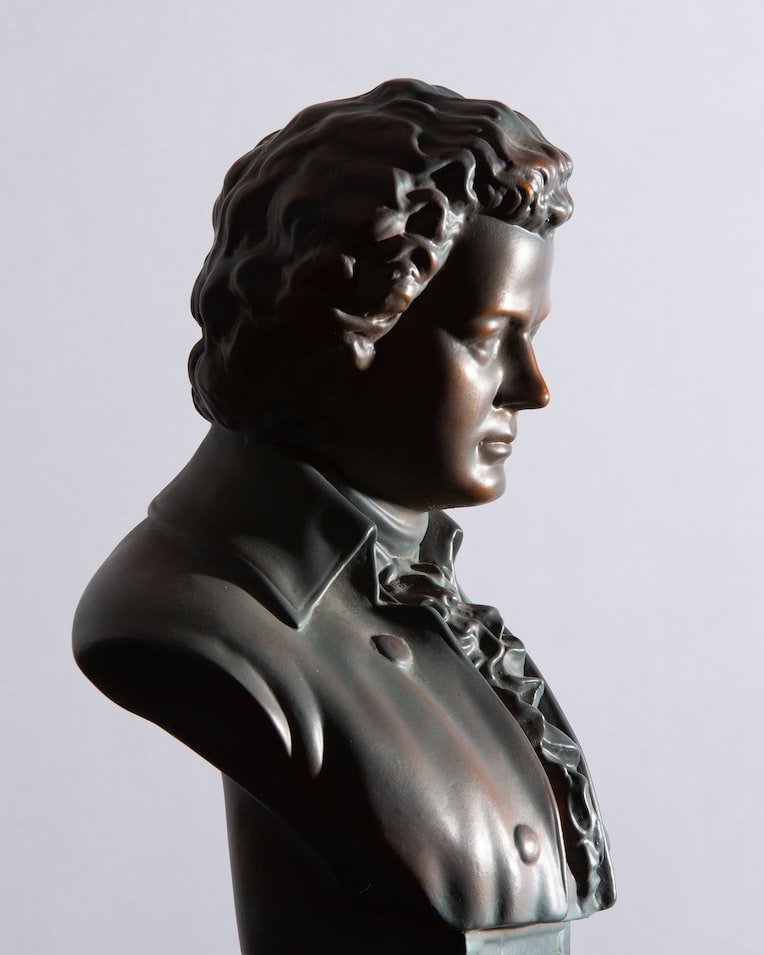NOTE:
NOTE:You can click either of these two links to visit the rest of the series😄
You can click either of these two links to visit the rest of the series😄⏪ PREV || NEXT⏩

In a world filled with anger, passion, talent, turmoil, and strive, no other comes as close to the legendary composer Beethoven.
So many times, I have read about his life and endeavors; and everytime single time I did, I simply could not stop myself from getting emotional.
Needless to say, Beethoven will always be one of my all time favourite composers; and he and his music will always and forever, have a special sentimental place in my heart.
Now, as we venture into his inspiring life, I ask that you read not with your mind, but with your heart.
Read with stillness, compassion, open mindedness, and sympathy; and I assure you that, you too, may gain a greater sense of enlightenment, awareness, and inspiration.
Well then...Shall we?

Ahhhhhhhhhh....ahhhhhhhhhh... aiyeeee yayeeeee yahhhhh...(Doing a much deserved longer ah cause I adore Beethoven) Beethoven! One of the greatest musicians to have ever lived, an unusually aggressive and hot tempered man, leading mover of the romantic era of music, and esteemed afficianado of everything melodrama! Good thing he only wrote one opera
Oh, did I forget to say that he almost broke a chair on a Prince's head one time😅. Yeah, very hot tempered guy.
Yes, from a very traumatic childhood to an even more tragic adulthood, it goes without saying that Beethoven's entire life had simply been one hurdle after another; one that I believe we could all learn from.
Well then, enough said, join me as we dive right into the inspiring world of Beethoven.
Born on December 16, 1770, in the city of Bonn, Germany, Ludwig van Beethoven was a German pianist and composer widely regarded to be one of the greatest musical geniuses of all time. His innovative ideas combined with his extreme original style, widened the scope of various sub-genres such as the symphony, concerto, and sonata. In fact, Beethoven is and always will be regarded, as the crucial figure that connected the Classical and Romantic era of Western music.
His early Life
With respects to law and custom, babies during Beethoven's time were often baptized immediately after 24 hours of birth. And although history is often thought to believe that Beethoven was born on October 17, 1770, in reality, the composer was most likely born on the 16th of that month.
Quite humorously, Beethoven always believed he had been born two years later than his official birth date. And anytime he was handed official papers that proved beyond any reasonable doubt his true birth date, Beethoven would outrightly and stubbornly disagree.
Family
During his childhood, Beethoven grew up with his two brothers, Caspar and Johann, alongside with his two parents Maria Magdalena (Mother) and Johann van Beethoven.
His father, Johann, was a mediocre court singer at the time lesser known for his musical abilities and more for his extreme alcoholism. However, his mother on the other hand, was a gentle and deeply moralistic woman.
Then there was his grandfather and namesake, Kappellmeister (musical director) Ludwig van Beethoven, whom was an esteemed an accomplished musician in Bonn and an endless source of inspiration to young Beethoven.
Beethoven's troubled childhood
Growing up, Beethoven's very first music teacher was his dear old father. And without a doubt, the manner and curriculum in which his father used to teach him, was nothing short of extreme and brutal. So much so that it traumatized the him for the rest of his life.
That's right, Beethoven suffered severe child abuse by his own father. Many times, neighbors had made account of the poor boy weeping profusely at the piano, standing on a high stool in order to reach the keys, and his father hitting him for every wrong note or hesitation he made while he played.
Infact, on a nearly daily basis, Beethoven was often flogged by his father, locked in a dark cellar, and deprived of sleep just to gain a few extra hours of practice at the piano. He also severely studied the violin and even took extra lessons from organists around town. All this, he was forced to do by his father, in hopes of someday becoming as prominent as the renowned child prodigy then, Wolfgang Amadeus Mozart.
And you know what, it sort of worked! Because after all this had passed, Beethoven ended up falling in love with music and became a prosperous and talented child prodigy. And whether or not this had anything to do with his father's cruel and unorthodox ways, is a mystery however.
When two legends meet
Now, not much evidence is given to this, but much like Franz Liszt had met with an older Beethoven, Beethoven himself, is said to have met with legendary composer, Mozart, during his teenage years.
The saying goes that after Beethoven had recieved a letter and invitation from one of Mozart's acquaintances, *Max Franz, he was granted entry into Mozart's home in Vienna.
Upon meeting, Mozart instructed Beethoven to play something on the piano.
Play something!
He said. And the boy instantly played one of Mozart's pieces - the Piano concerto No. 24 in C minor. Then, just a few bars into the music, Mozart abruptly stopped him.
Oh, no that!
Mozart said.
Anybody can play that. I want you to play something of your own.
So Beethoven did just that! And upon hearing the boy's piece, Mozart quickly ran out to the living room where his wife Constanze had been entertaining guests, and exclaimed:
Stanzi! Stanzi!
He cried, pointing back into the music room where Beethoven was.
Watch out for that boy! One day he'll make a name for himself and give the world something to talk about!
Ha! Apparently, greatness recognizes greatness :)
Interestingly, Mozart had agreed to take Beethoven as a pupil of his but after receiving an urgent letter from his father, demanding him to return back to Bonn, Beethoven missed the opportunity of a lifetime to study with his hero whom he had so much admired.
Sadly, by the time Beethoven had returned to Vienna, Mozart had already passed away.
Tragedy strikes
Around the time Beethoven began composing some of his most astonishing and immortal works, he was struggling to come to terms with a horrifying tragedy, one which he so desperately tried to conceal: He was going deaf!
And by the turn of the 19th century, Beethoven already began experiencing hardships in communicating with people. Revealed in a heartbreaking letter to his friend Franz Wegeler, Beethoven writes:
I must confess that I lead a miserable life. For almost two years I have ceased to attend any social functions, just because I find it impossible to say to people: I am deaf. If I had any other profession, I might be able to cope with my infirmity; but in my profession it is a terrible handicap.
Heiligenstadt Testament
Often driven to extremes of melancholy and moral affliction, Beethoven would often rant away his despairs in a note. His sorrows concealed away from the rest of the world, as his most intimate feelings expressed itself on paper. Oh, just the thought of it now makes me grieve for him.
And in a letter dated back to as far as October 6, 1802, in what is commonly referred to as the Heiligenstadt Testament, you can see an excerpt from the note that shows just how troubled Beethoven must've been by the illness:
O you men who think or say that I am malevolent, stubborn or misanthropic, how greatly do you wrong me. You do not know the secret cause which makes me seem that way to you and I would have ended my life — it was only my art that held me back. Ah, it seemed impossible to leave the world until I had brought forth all that I felt was within me.
Miraculously, despite this severe handicap, Beethoven didn't let his ailment stop him and he continued composing at an exceedingly furious pace before he went completely deaf at the age of 45.
Composing as many as six symphonies, four solo concertos, five string quartets, six-string sonatas, seven piano sonatas, five sets of piano variations, four overtures, four trios, two sextets, 72 songs, and one opera.
Inclusive of these works, are also some of his most popular and iconic pieces such as the moonlight sonata(the one you ought to be listening to right now), his Erotica and Emperor symphonies, his Violin sonata Kreutzer, Fur Elise, his opera, Fidelio, and his supposedly cursed symphony - the symphony No.9(Ode to Joy).
The Curse of the Night Symphony
For those of you who might not be familiar with this popular myth in the classical community, the curse of the ninth symphony is basically a superstitious belief that entails how every composer who completes their ninth symphony, would die soon after.
This myth, of course, can be traced to composers like Beethoven and Schubert. Beethoven, whom died shortly after he premiered his ninth symphony and Schubert, whom couldn't even long enough to finish his own.
See Schubert unfinished Symphony
But of course, this curse is but only a myth.
Or is it? 😈
Take the composer Gustav Mahler for example, whom after obsessing over the supposed curse for many years, skipped his ninth symphony and began working on a secretly coded Tenth Symphony. However, after returning back to finish his ninth symphony at the end of the day, he immediately contacted pneumonia and died at the age of 51.
Coincidence?.... I think not😈
Death
Anyway, at the end, Beethoven died on March 26, 1827 as a result of post hepatic cirrhosis of the liver. And much like Shakespeare, Beethoven's works stands at the outer limits of human capabilities and brilliance!
Truly, he was nothing short of a musical genius. And the sheer fact that most of his most extraordinary works was composed when he was deaf, proves his superhuman capabilities indeed.
However, I still find it all the more sad how the whole world could enjoy his glorious music yet he... well... He just couldn't hear it!
Pun not intended :)
Summary
I think we can all agree when I say there was no other and there will be none other like Ludwig van Beethoven again. In terms of the jaw dropping output of outstanding, complex, passionate, beautiful, and original music Beethoven had produced, I personally believe he is unrivaled by no other composer in history!
Although, two other composers do tend to come to mind👀
Anyway, to conclude this chapter, I would like to finish up with his famous last words. The very words he remarked aloud on his deathbed. And I quote:
Applaud my friends, for the comedy is now over.
Now wasn't that a treat? Ahh... Beethoven... So inspiring! In retrospect, I believe the most inspiring thing about his life would've been his passion. His burning passion for his craft and his ever so persistence, despite all odds, to achieve his goal.
Yes.... that, I believe, is the greatest lesson Beethoven has shown us here.
To end this post, I'll leave you with an interesting short story that oddly shows just how passionate Beethoven was. So passionate in fact, that it transcended the barriers of death...😅
When Beethoven passed away, he was buried in a church yard. A couple days later, the town drunk was walking through the cemetery and heard some strange noise coming from the area where Beethoven was buried. Terrified, the drunk ran and got the priest to come and listen to it. The priest bent close to the grave and heard some faint, unrecognizable music coming from the grave. Frightened, the priest ran and got the town magistrate.
When the magistrate arrived, he bent his ear to the grave, listened for a moment, and said, "Ah, yes, that's Beethoven's Ninth Symphony, being played backwards."
He listened a while longer, and said, "There's the Eighth Symphony, and it's backwards, too. Most puzzling." So the magistrate kept listening; "There's the Seventh... the Sixth... the Fifth..."
Suddenly the realization of what was happening dawned on the magistrate; he stood up and announced to the crowd that had gathered in the cemetery, "My fellow citizens, there's nothing to worry about. It's just Beethoven decomposing!"
Well, until next time when we dive into the inspiring world of the great reggae musician: Bob Marley!



